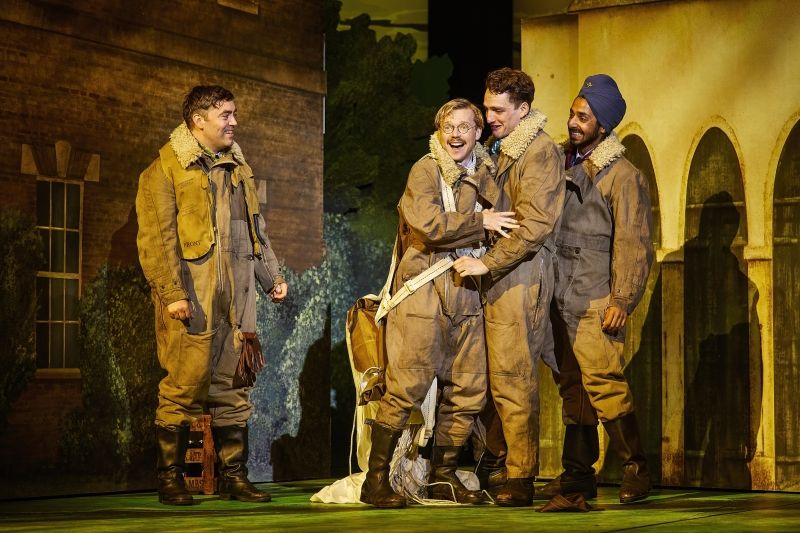Review: JACK ABSOLUTE FLIES AGAIN, National Theatre
After a two-year delay Richard Bean and Oliver Chris's new play lands on the Oliver stage. It's nothing to write home about.

![]()
 Jack Absolute Flies Again! Originally scheduled for the Spring of 2020, it took two years, a director change, and a cast reshuffling for the show to get off the ground. It finally lands at the Olivier in a flashy production that has very little substance. One wonders how such a play ended up on one of the most coveted, prominent stages in London.
Jack Absolute Flies Again! Originally scheduled for the Spring of 2020, it took two years, a director change, and a cast reshuffling for the show to get off the ground. It finally lands at the Olivier in a flashy production that has very little substance. One wonders how such a play ended up on one of the most coveted, prominent stages in London.
With a set right out of a pop-up storybook, we take up camp in the middle of quaint, whimsical 1940 Sussex. The RAF are using Mrs Malaprop's mansion as a base, messing up her croquet meadow. In true Restoration fashion, ruses are conceived, identities are swapped, and kisses are stolen.
Comedies of manners used to be a satirical look at sophisticated society. This reworking of Richard Brinsley Sheridan's The Rivals by Richard Bean and Oliver Chris is a pantomime, a patchy wartime farce stuck together with cheap glue and even cheaper jokes.
Their first act comes in the shape of machine-gun comedy, and not exactly in a good way. The punches are relentless and the audience don't get any respite to take stock of the quality of the humour (which, I'm afraid, turns stale very quickly). Caroline Quentin introduces Mrs Malaprop defending her own grammar and specifying that neither Imelda Staunton nor Helen Mirren were available for the role.
Her presentation of the situation at hand is marred by loud aircrafts flying over the area, a happenstance that mysteriously doesn't repeat until the act breaks. Another self-described dramatic device aids the action along: Lydia's maid Lucy (Kerry Howard) wins the audience's favours quickly with a Fleabag effect.
The meta-theatre elements make the show a self-aware hazard, but there are a few genuinely funny bits in the gimmick. Among the double entendres and the easy one-liners, the not-so-secretive asides are brief breaths of fresh air. But it doesn't last.
Where the first act is exhausting in its exceedingly calibrated crassness and poised naughtiness, the second takes a chill pill and relaxes, but ends up a tired shadow compared to the one before. Mostly, the piece is an overly long, confused pastiche that's excessively eager to please.
The in-your-face comedy of the first part is tiring and trite, a tacky set-up for the disappointing and unsatisfying unknotting that happens later on. Sheridan's original play belongs to a time where the stereotyping of class and gender was the epitome of hilarity. Today, it becomes a boring, outdated excuse to hold on to "the good ol' days" and make posh people laugh at the wrong sides of the critique.
As it's become the sad norm, Northern and generally non-RP accents are used to identify and berate the lower-class, who are sexually objectified or mocked by their upper-class counterparts. Lydia (Natalie Simpson) is attracted to Yorkshireman Dudley (Kelvin Fletcher) because of his dirty, manly existence as a fitter. She tries so hard to be the 1940 version of woke, but stays a pompous, entitled snob that's quite unlikeable.
Jack (Laurie Davidson) puts on an intelligible accent when he pretends to be him to get to Lydia. It's all a bit dull. Where exactly is the fun? The issues of the text are mitigated with a token non-white character, Bikram Khattri (who everyone cheerily calls Tony because they can't pronounce his real name!). But having non-Caucasian actors on a stage doesn't justify archaic comedic treatment that hides behind the now obsolete brand.
Among the wreckage lie a handful of truly hilarious performances. Quentin and Howard are subtle and ingenious even with such a harshly obvious and clumsy supply of humour, and Jordan Metcalfe becomes a comic relief inside the comedy itself as Roy, the bumbling, sweet, insecure pilot.
Peter Forbes is a booming presence as he thunders over his son Jack, who, in spite of titling the play, is the most uninteresting of roles. Davidson plays the typically handsome and mediocrely cunning protagonist of the genre, there are far better characters. The cast do their best to carry the weight - and they mostly do - but they can't do miracles.
Mark Thompson's design is perhaps the most striking and thoroughly positive feature of this production. The Sussex countryside becomes an idyllic diorama. The set opens and pushes forward the inside of Mrs Malaprop's house, with its loud, garish rooms that are supposed to announce their wealth to the eye of strangers.
Burns uses the vast Olivier stage well, although, it's to be said, that's probably because Thompson's dressing drastically reduces the available walkable space. Paul Englishby fills the room with an amiable score and Tim Lutkin plays with unnatural lighting and shadow patterns.
Two projected interludes take over the whole auditorium to catapult the public in the middle of an air strike. Designed by Jeff Sugg, they're impressive but run long, just as the play itself. There simply isn't enough action to cover the two and a half hours.
The best thing that Bean and Chris could do is take another page out of Sheridan's book. Regroup, rewrite, redeliver. Much like the first outing of the material in 1775, this is not very good.
Jack Absolute Flies Again runs at The National Theatre until 3 September.
Photo Credit: Brinkhoff-Moegenburg
Reader Reviews
Videos

